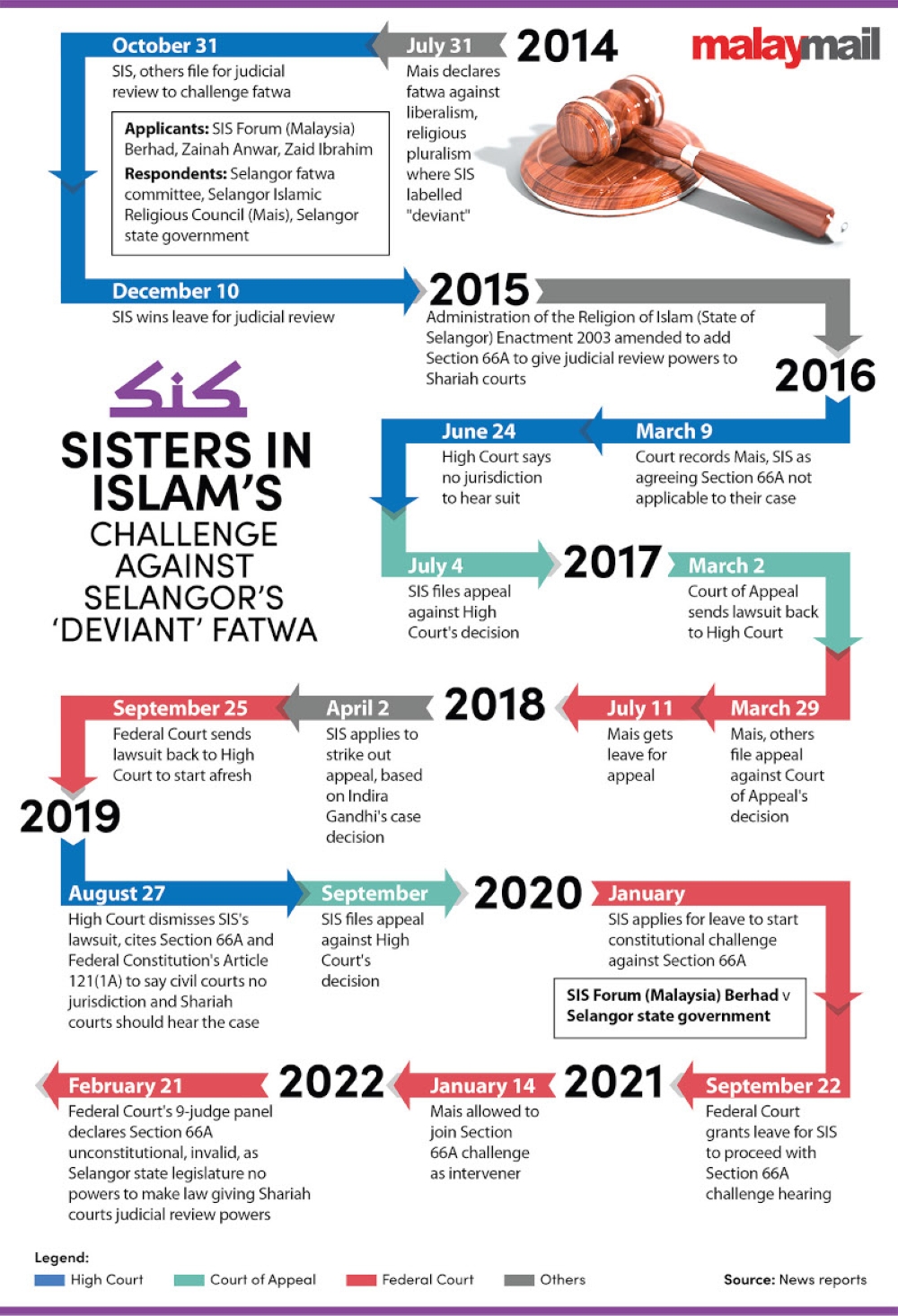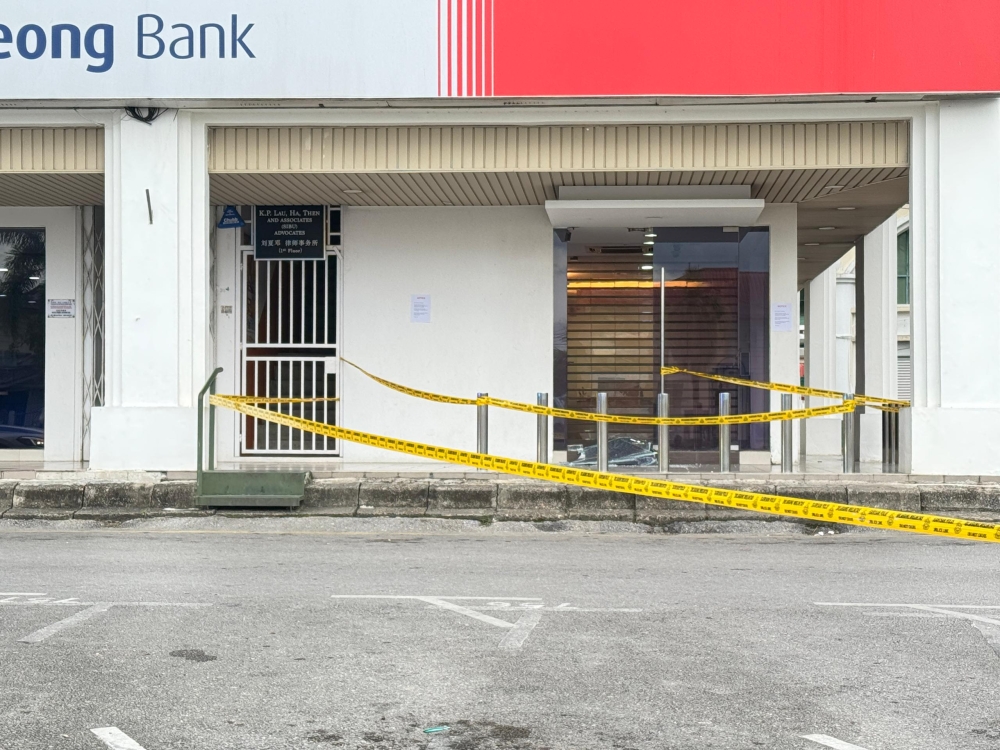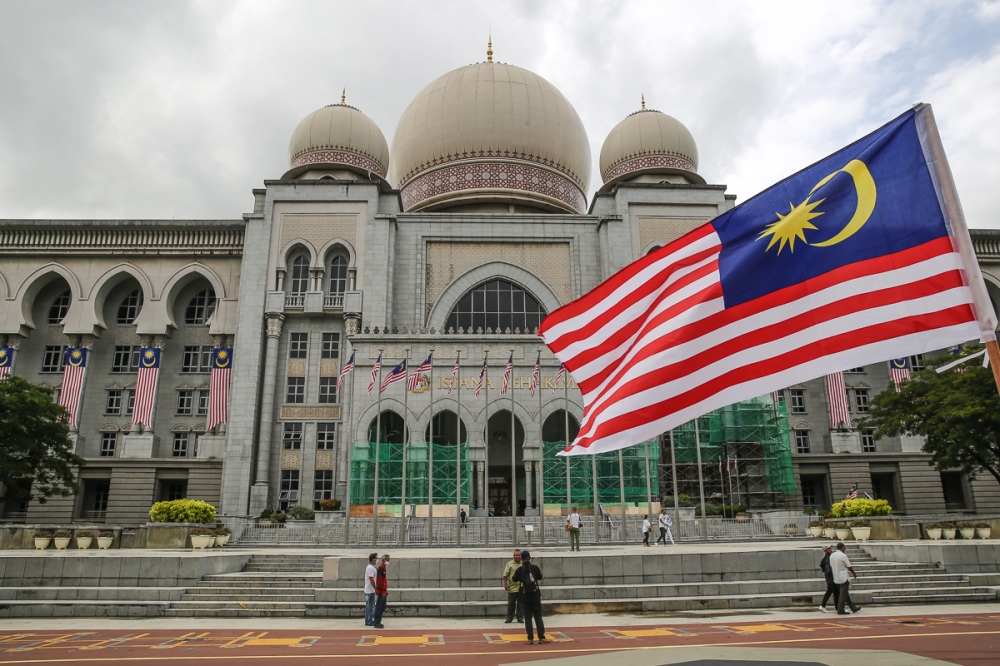KUALA LUMPUR, March 14 — The Court of Appeal in a majority ruling today dismissed a challenge by women’s rights group Sisters in Islam’s (SIS) — via SIS Forum (Malaysia) Bhd — against Selangor’s 2014 fatwa which had labelled the company as deviant from the teachings of Islam.
The majority decision was made by the panel’s chair Datuk Has Zanah Mehat and Datuk Che Mohd Ruzima Ghazali.
In reading the broad grounds of the majority ruling, Che Mohd Ruzima said the High Court’s August 27, 2019 decision — which SIS Forum had appealed — was correct.
“As a majority, we find no merit in the appellant’s appeal which justifies our intervention at the appellate stage. With that, the appellants’ appeal is dismissed, and the High Court’s decision is maintained. We use our discretion to make no order as to costs,” the judge said when reading out the broad grounds of his judgment online through the video-conferencing platform Zoom.
Datuk M. Gunalan, the other judge on the Court of Appeal panel, gave his minority or dissenting judgment — which, among other things, viewed that the Selangor Islamic bodies could not apply the fatwa to SIS Forum (Malaysia) Bhd as it is a company not capable of professing the religion of Islam.
SIS Forum’s lawyer Datuk Malik Imtiaz Sarwar then immediately applied for the status quo to be preserved while his clients pursue an appeal at the Federal Court.
The Court of Appeal then agreed to issue an interim stay order to ensure that the fatwa is not enforced on SIS Forum or the appellants for now.
Imtiaz said he would be formally filing a written application for an Erinford injunction — similar to a stay order — to have the status quo preserved until the Federal Court decides on his clients’ bid to appeal the matter. Until the courts decide whether to grant the Erinford injunction, the Court of Appeal’s interim stay order today will continue to apply.
The interim stay is important as the 2014 fatwa issued by the Selangor fatwa committee is extensive, labelling SIS Forum (Malaysia) and any individuals, organisations or institutions holding on to liberalism and religious pluralism beliefs as deviant from the teachings of Islam. The fatwa did not explain or define the phrase “liberalism and religious pluralism”.
The Selangor fatwa issued and gazetted in July 2014 had also said any publications with elements of liberalism and religious pluralism should be “diharamkan” (banned or made forbidden) and can be seized, stating that the Malaysian Communications and Multimedia Commission (MCMC) should block any social websites which goes against the teachings of Islam and hukum syarak (Islamic law), and also declared that any individuals holding on to liberalism and religious pluralism beliefs should repent and return to the path of Islam.
SIS Forum (Malaysia) Bhd’s lawyer Surendra Ananth later confirmed to Malay Mail that the company will be filing for leave to appeal at the Federal Court.
Appeals to the Federal Court are not automatic, as the Federal Court will have to first decide whether to grant leave or whether it would proceed to hear and decide on the appeal.
Apart from Imtiaz and Surendra, lawyer Fahri Azzat also represented the three appellants in this case today, namely SIS Forum (Malaysia) Bhd, Zainah Anwar and Datuk Mohd Zaid Ibrahim.
The Selangor fatwa committee was represented today by lawyers Datuk Zainul Rijal Abu Bakar, Danial Farhan, Azman Marsaleh, while Mais was represented by lawyers Yusfarizal Yussoff and Majdah Muda, and the Selangor state government was represented by Selangor state legal adviser Datuk Salim Soib @ Hamid and assistant state legal adviser Husna Abdul Halim.
SIS executive director Rozana Isa and SIS founding member Zainah Anwar attended the Zoom session today, while Md Rasyid Ridha also attended as a representative for Mais.
What the Court of Appeal decided today
In brief, here’s what the Court of Appeal’s majority decision read out by Che Mohd Ruzima today decided:
The Court of Appeal said it was bound by the Federal Court’s 2022 decision in a SIS Forum case which challenged the constitutionality of Section 66A of the Administration of the Religion of Islam (State of Selangor) Enactment 2003.
In that case, the Federal Court had decided that only the civil High Court has the jurisdiction to hear and decide on judicial reviews and also ruled that Section 66A — which attempted to give the Shariah courts the power to hear judicial reviews — was invalid as it went against the Federal Constitution.
“With that, this court is bound to that decision, which found that the Shariah courts have no jurisdiction to hear judicial reviews,” the judge said.
But Che Mohd Ruzima went on to say that some of the matters in SIS Forum’s case today should be decided by the Shariah courts instead of the civil courts, and gave the view that a fatwa cannot be challenged through judicial review.
In deciding whether the civil High Court has the powers to hear and decide on SIS Forum’s judicial review application, Che Mohd Ruzima said it must first be decided whether the civil High Court has jurisdiction to hear on the core issues of the case.
Che Mohd Ruzima noted that the Selangor fatwa committee is given powers under Section 47 of the 2003 Selangor law to prepare a fatwa on any “unsettled or controversial question” relating to hukum syarak (Islamic law), and said that this meant fatwas are under the Shariah courts’ “exclusive jurisdiction” due to fatwas revolving on matters based on Islamic law.
Arguing that SIS Forum’s judicial review application directly disputes the Selangor fatwa committee’s views regarding matters relating to hukum syarak or Islamic law, Che Mohd Ruzima said the respondents had testified that liberalism and religious pluralism deviates from “akidah” (creed) and “syariah” (Islamic law) in Islam.
“Matters relating to akidah and syariah of the religion of Islam is certainly only under those whose expertise is in hukum syarak; therefore, we find those matters should be disputed in the Shariah courts, not in the civil courts,” he said.
The judge also said the fatwa is “dynamic” in nature as the Selangor fatwa committee can amend, modify or revoke the fatwa which is regarding its views about SIS Forum.
“This means the applicant can at any time apply for the respondent to review, if it can be proven their philosophy does not amount to liberalism and religious pluralism beliefs which are found to have deviated from the true teachings of Islam,” the judge said, referring to SIS Forum as the applicant.
“Based on those reasons, we are of the view that the gazetted fatwa is not final in nature. With that, we are of the view that a fatwa is not something that can be challenged through a judicial review,” he said.
But even if the Court of Appeal accepts SIS Forum’s arguments that its challenge was on the procedure in which the fatwa was made and not regarding hukum syarak, the judge said the majority ruling still views SIS Forum’s appeal to be without merit due to those reasons.
As for the Federal Court’s 2022 judgment in SIS Forum’s case which said the professing of religion can only be done by natural persons or a human being instead of artificial persons, Che Mohd Ruzima viewed the remarks to be “obiter dictum” or remarks made in passing in the challenge against Shariah courts being given powers to hear judicial review.
One of the key issues in this case is whether the 2014 fatwa applies to SIS Forum which is a company, with its lawyers having argued that it could not profess the religion of Islam as it is an artificial person, based on the Federal Court’s decision in a 1998 case and the Federal Court’s 2022 decision.
The Court of Appeal instead focused on the “philosophy” which it said SIS Forum would be able to hold.
Among other things, the Court of Appeal judge said the Selangor fatwa committee’s views regarding practices and laws in Islamic teaching are not related to the professing of religion, and went on to say that SIS Forum (Malaysia) Berhad which has a mission for its establishment would also be able to have “philosophy” and beliefs.
The judge said that SIS Forum’s philosophies can be shown through activities held, and that suitable action can be taken under the law if the philosophy and activities held by SIS Forum goes against any law.
The judge then concluded that this means that any issues relating to whether SIS Forum can profess religion does not arise in this case.
The Court of Appeal’s majority decision was also of the view that the Selangor fatwa committee had complied with the procedures under Section 48 of the 2003 Selangor law when it issued the fatwa against SIS Forum.
Che Mohd Ruzima said the Selangor fatwa committee did hold a dialogue with SIS Forum and viewed that such a dialogue gave SIS Forum space to state its vies about philosophy can manifested its right to be heard before the fatwa was issued.
But even if the dialogue is viewed as being insufficient for SIS Forum to exercise its right to be heard, Che Mohd Ruzima said the majority of the panel’s judges were of the opinion that the procedure of making a fatwa itself does not require a right to be heard to be given to SIS Forum, and that the Selangor fatwa committee’s duty is only to give its views on SIS Forum’s philosophy.
“The first respondent (Selangor fatwa committee) only gave views on the current philosophy of the first applicant (SIS Forum) and its members that were expressed through writings and opinions. With that, we view that in such a situation, there is no need for the right to be heard to be given,” the judge said.
The Court of Appeal’s majority decision was also of the view that SIS Forum had failed to show that the 2014 fatwa issued by the Selangor fatwa committee was ultra vires or had gone beyond its powers under the 2003 Selangor law.
The Court of Appeal agreed with the High Court decision which said the 2014 fatwa had not gone against the Printing Presses and Publications Act’s (PPPA) Section 7 and the Communications and Multimedia Act’s (CMA) Section 3(3).
The Court of Appeal said the High Court was not wrong to say that the 2014 Selangor fatwa only makes publications with liberalism and religious pluralism forbidden and does not give the Selangor fatwa committee to seize such publications, as the power to prohibit publications is still in the hands of the home minister.
The Court of Appeal also agreed with the High Court’s views that the Selangor fatwa committee merely asks the MCMC to block websites and does not give itself the power to do so.
The Court of Appeal went on to highlight that the Selangor 2014 fatwa only states a prohibition on liberalism and religious pluralism beliefs and only requires individuals to repent and return to Islam, and does not involve matters such as physical punishments.
The majority decision also ruled that the 2014 fatwa did not go against Article 5 and Article 8 of the Federal Constitution.
In short, the majority decision in the Court of Appeal agreed with the High Court that the civil High Court has no jurisdiction to hear and decide on SIS Forum’s challenge.
What the dissenting judge said
As for Court of Appeal judge Gunalan, he was of the view that the High Court decision was incorrect and that SIS Forum should succeed in its appeal.
Regarding the High Court’s 2019 decision that civil courts have no jurisdiction to hear SIS Forum’s case due to Section 66A of the 2003 state law, Gunalan said this was no longer an issue as the Federal Court in its 2022 landmark decision had already unanimously struck down Section 66A as invalid.
He focused on the five key issues in this appeal, with the first issue being whether the Selangor Islamic bodies lacked the powers to make the 2014 fatwa as SIS Forum is a company and not a person professing the religion of Islam.
The four other key issues are whether the fatwa was ultra vires or went beyond the 2003 Selangor law and whether it violated the PPPA and CMA and the Federal Constitution’s Articles 5, 8, 10, 11 and whether it had breached the rules of natural justice.
For these five key issues, Gunalan said he would comment on only the first matter, which he said was enough to have the case decided in SIS Forum’s favour. He said he would comment on the four other matters in a full judgment if there is an appeal.
Highlighting the Federal Court’s 2022 and 1998 decisions stating that only natural persons or human beings could profess or declare a faith, Gunalan emphasised the doctrine of “stare decisis” — where courts should follow binding precedent of previous decisions — as being an important part of Malaysia’s judicial system.
“It is particularly so when the apex court has come to final determination on constitutional questions of great significance which are squarely in point with the present appeal and grounds to challenge the decision of the High Court. On this point, I am unable to agree with the view of the majority that the pronouncement was merely obiter and need not be followed in this case,” the judge said.
In other words, Gunalan disagreed with the two other Court of Appeal’s judges’ views that the Federal Court’s 2022 judgment which said artificial persons — which would cover companies like SIS Forum — cannot profess a religion was only a passing remark, and viewed that it should be followed by the Court of Appeal in today’s case.
Previously, SIS Forum had argued that the Selangor fatwa committee could not issue and gazette the fatwa as SIS Forum as an incorporated company could not embrace the religion of Islam.
In commenting on the first key point, Gunalan again cited the Federal Court’s 2022 decision which also adopted the Federal Court’s 1998 decision which held that companies — like SIS Forum — are not capable of professing any religion.
“This is where the importance of the SIS Forum decision comes into picture. The Federal Court in that landmark decision unequivocally and without any reservation held that the respondents had no jurisdiction at all over artificial persons like a limited company established under the Companies Act or any corporations,” the judge said.
Agreeing that the High Court judge had erred when deciding the Selangor Islamic bodies could issue the 2014 fatwa against SIS Forum, Gunalan said the High Court was also wrong to lift the corporate veil to show that the company’s directing minds are Muslims.
“In my considered view and with respect, the learned judge had no basis in court to lift the corporate veil on the first appellant (SIS Forum) and make a finding that the controlling minds of the first appellant (SIS Forum) are Muslim and therefore the company itself could be considered as professing the faith of Islam,” he said, viewing the High Court’s approach to be incorrect in law.
Based on the Federal Court’s 2022 decision, Gunalan also said the 2014 fatwa against SIS Forum should definitely fall outside the scope of matters falling within the states’ jurisdiction in the Federal Constitution — where the state has powers over a list of matters involving “persons professing the religion of Islam”.
“I would conclude that at this juncture on this ground alone, among others, we should hold that the learned judge had erred in law in deciding the appellants’ judicial review application should be dismissed,” the Court of Appeal judge said when expressing the view that SIS Forum’s appeal should be allowed.
As Gunalan’s judgment is the minority judgment, the majority decision — which dismissed SIS Forum’s appeal — will apply to this case.




















